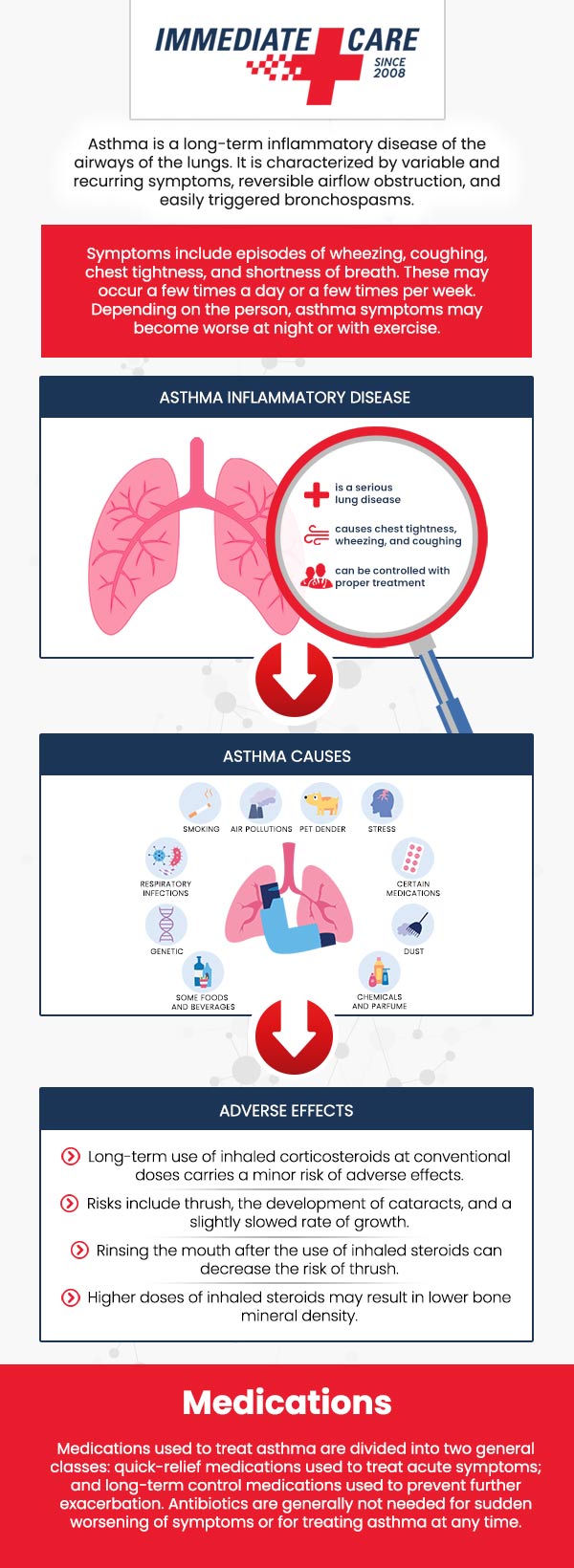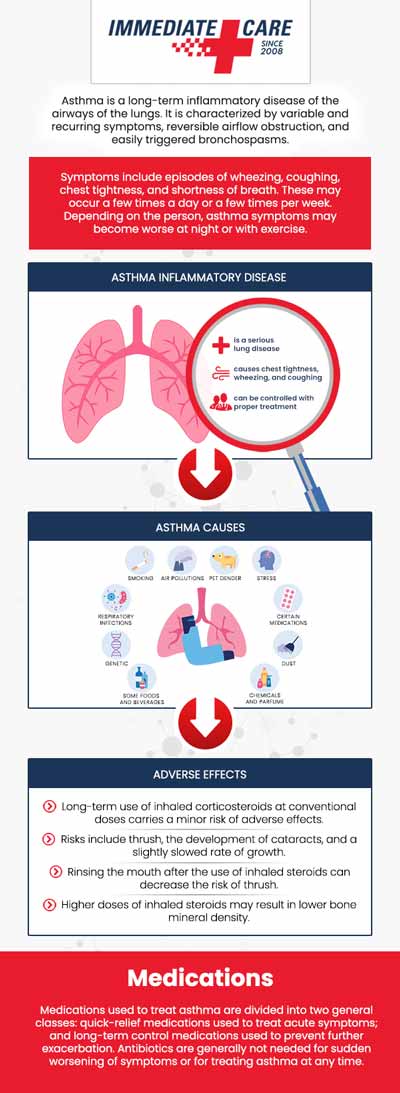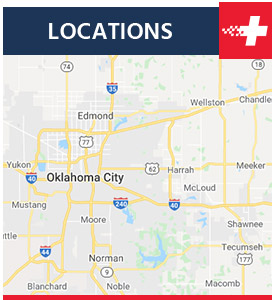Allergic Asthma Treatment in Oklahoma City, OK
Allergic asthma is a respiratory illness in which allergens such as dust mites, pet dander, pollen, and mold cause the airways to contract, resulting in asthma symptoms. Asthmatic patients may have trouble breathing, wheezing, coughing, and shortness of breath. Dr. Kevin Penwell, D.O., and his dedicated team at Immediate Care of Oklahoma provide comprehensive allergic asthma treatment to enhance the quality of life. For more information, contact us or schedule an appointment online. We have convenient locations to serve you in Oklahoma City, OK.




Table of Contents:
What triggers allergic asthma?
How long does allergic asthma last?
When should I go to the doctor for allergic asthma?
How do you test for allergic asthma?
Allergic asthma is a chronic respiratory disorder that is caused by exposure to allergens such as dust mites, pet dander, pollen, mold, and cockroach droppings. When a person with allergic asthma comes face to face with an allergen, their immune system overreacts and produces antibodies called Immunoglobulin E (IgE).
Allergic asthma is the most well-known form of asthma, affecting up to 60% of people with this condition. It often develops during childhood, although it can also occur in adults. Genetic factors play a role in the development of allergic asthma, and a family history of allergies or asthma can increase the risk of developing this condition.
Other factors can trigger or irritate allergic asthma, including air pollution, respiratory infections, smoke, exercise, cold air, and stress. Exposure to these triggers can cause an increase in airway inflammation and a worsening of your symptoms.
Treatment for allergic asthma typically involves a combination of medications and environmental control measures. Medication prescriptions such as inhaled corticosteroids, bronchodilators, and leukotriene modifiers can help to reduce inflammation and improve breathing. Environmental control measures such as avoiding allergens and irritants, using air filters, and maintaining good indoor air quality can also help to reduce symptoms and prevent asthma attacks.
Allergic asthma is a chronic respiratory disorder, which means that it lasts for a long time. It’s a condition that can be managed and handled with the proper treatment, but it cannot be cured. The duration and intensity of symptoms can vary from individual to individual and may depend on factors such as the person’s age, overall health, and exposure to triggers.
Symptoms of allergic asthma can last for a few minutes to several hours and can range from mild to severe. Some people may experience symptoms only during certain times of the year when specific allergens are present, while others may experience symptoms year-round.
If you suspect that you have allergic asthma, it’s important to seek medical attention from a healthcare provider who specializes in respiratory conditions. You should schedule an appointment with a doctor if you are experiencing symptoms such as wheezing, coughing, shortness of breath, and chest tightness.
At your consultation, you will discuss your symptoms and medical history, and your doctor may perform diagnostic tests such as spirometry, which measures how much air you can exhale, and allergy testing, which can help identify specific allergens that trigger your symptoms.
It’s important to follow your doctor’s instructions for managing your asthma, which may include taking prescribed medications, avoiding triggers, and monitoring your symptoms.
To test for allergic asthma, healthcare providers will usually start by conducting a physical exam and taking a thorough medical history. They will ask you about your symptoms when they occur, and if you have any known allergies or a family history of allergies or asthma.
Your healthcare provider may also perform diagnostic tests to help confirm a diagnosis of allergic asthma.
These tests may include:
1. Spirometry: This test measures how much air you can breathe out and how quickly you can exhale. It can help determine how well your lungs are functioning and if there is any obstruction to your airways.
2. Methacholine challenge: This test involves inhaling a substance called methacholine, which can cause airway constriction. By monitoring your lung function before and after inhaling methacholine, your healthcare provider can determine if you have asthma.
3. Allergy testing: This test involves exposing your skin to small amounts of various allergens and monitoring your body’s reaction. If you have an allergic reaction to a particular allergen, it may indicate that you have allergic asthma triggered by that allergen.
4. Fractional exhaled nitric oxide (FeNO) test: This test determines the level of nitric oxide in your breath, which can indicate airway inflammation. High levels of FeNO can be a sign of allergic asthma.
5. Chest X-ray or CT scan: These imaging tests can help your healthcare provider rule out other conditions that may be causing your symptoms, such as pneumonia or lung cancer.
At Immediate Care of Oklahoma, Dr. Kevin Penwell, D.O. offers effective treatment options to manage and enhance your overall well-being to achieve a better quality of life. For more information, contact us or schedule an appointment online. We have convenient locations to serve you in Oklahoma City, OK. We serve patients from West Moore OK, Norman (HealthPlex) OK, Norman (24th) OK, Edmond OK, Yukon OK, I-240 & Sooner RD OK, Tecumseh OK, and Bethany OK.


Additional Services You May Need
▸ Urgent Care Services
▸ Illness + Injuries
▸ On Site Lab + X-Ray
▸ Helpful Health
▸ Motor Vehicle Accidents
▸ Drug Testing
▸ MRO
▸ UTI Treatment
▸ Employment Physicals
▸ Workers Comp
▸ Strep Throat Treatment
▸ Pregnancy Testing
▸ Blood Pressure Testing
▸ Urinalysis
▸ Mononucleosis Treatment
▸ Suture Removal
▸ Respiratory Syncytial Virus
▸ OccMed








